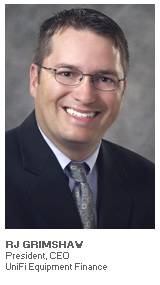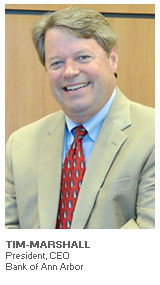On July 1st, Bank of Ann Arbor, the parent company of Ervin Equipment Finance announced the renaming and rebranding of the leasing company it acquired in January 2013 to UniFi Equipment Finance. This total rebranding initiative is the result of more than eight months of market research conducted by the bank, and reflects an image that better suites the organization. According to the company, UniFi signifies unity; unity between UniFi, their vendors and customers. The rebranding is a critical component of a strategic plan to position UniFi Equipment Finance – an equipment finance company with a history spanning over thirty-five years – as a major player serving the vendor, captive and end-user markets nationally.
The head coach of this re-energized equipment finance company is industry veteran RJ Grimshaw. Grimshaw originally joined the former Ervin Equipment Finance in August 2013 as Executive Vice President and Chief Sales Officer to lead all aspects of growth for the company. His immediate success in this role led to being elevated only four months later to the leadership role within this company and he is now spearheading the entire company’s rebranding and growth initiatives on a nationwide scale.

A number of community banks have announced their entrance into the equipment finance industry over the past year – some launching de novo operations, while others lifted out leadership teams from other equipment finance companies to quickly establish themselves as new players in the industry. However in this case, there is a deep history between the Bank of Ann Arbor and the newly rebranded UniFi Equipment Finance – a history that spans over fifteen years.
We spent time with the Tim Marshall, President and CEO of Bank of Ann Arbor and RJ Grimshaw, President and CEO of UniFi Equipment Finance to learn a bit more about the history of this relationship, the reason for the acquisition, and the vision for UniFi Equipment Finance’s growth initiatives.
Equipment Finance Advisor: Tim, please tell our readers a bit about the history of the bank’s relationship with the former Ervin Leasing Company and the timing behind this decision to enter the equipment finance sector nationally by Bank of Ann Arbor?
Tim Marshall: Bank of Ann Arbor had done business with Ervin Leasing Company since the late 1990s in the form of warehouse line financing. As far back as 2002 – 2003, we had conversations regarding acquiring the leasing company from its parent – Ervin Industries. However the parent was not interested in divesting of the leasing company at the time. Over the years we watched management grow the leasing operation nicely and we became one of a number of banks providing warehouse lines for their small ticket leasing operation. When the financial downturn hit, Ervin Leasing experienced a period of low growth, and like many equipment finance companies, lost many of its warehouse lending relationships. As a result, Ervin Industries made the decision to wind down the portfolio over time and take a wait-and-see approach during the downturn.

In 2011, after the crisis was subsiding, Ervin came to us again for warehouse financing to rebuild the portfolio. We knew the management team and were impressed by the conservative approach they had taken during the downturn, so we re-established a line and they began the process of rebuilding the portfolio. Then in September 2012, Ervin Industries decided to sell the leasing operation. The bank was one of many banks and private equity firms interested in the acquisition, and we were fortunate to acquire the company as it is a true cultural fit for Bank of Ann Arbor.
EFA: A recent press release indicated that monthly originations more than doubled in 2013 under RJ Grimshaw’s sales leadership. What talents and skills does RJ possess making him the right person for this important leadership position with UniFi Equipment Finance?
Marshall: To be successful in any business line, you need a champion leading the company who is always thinking about what needs to be done to make the product line and operation as successful as possible. That is what we have with RJ Grimshaw. We are very fortunate to have attracted a professional with the experience, skill, energy and passion of RJ Grimshaw. Since joining us, RJ has attracted a highly-skilled team of sales professionals, while simultaneously building the platform and backroom required to succeed and we are now positioned as a national player in the small ticket leasing market under our new brand.
EFA: RJ, what attracted you personally to this opportunity to build a leasing company for Bank of Ann Arbor versus other bank and non-bank equipment finance opportunities?
Grimshaw: Ervin Leasing had enjoyed longevity in the marketplace with a brand that flew under the radar for 35 years. Knowing this, and after gaining a clear understanding of the success Bank of Ann Arbor enjoys in their markets under Tim’s leadership, I knew it was a fit. So, I went from commuting for a short period of time in my original role as Chief Sales Officer, to relocating to Ann Arbor to lead the organization and demonstrate the level of commitment needed to be successful.
I must say that my first two months here I felt like a football coach recruiting a team. But as the word spread about us, I quickly went from a college coach recruiting players to a coach receiving film on professionals who wanted to join us. As a result we have successfully hired some top-level professionals in the industry.
Continued on Page 2...
EFA: Would you agree that an important element to achieving success in a bank-owned leasing company is working closely with the lenders to stimulate interest in offering the equipment finance product?
Grimshaw: Yes, and my past experiences working within a bank are certainly helpful in this situation. Building awareness about the products for the lenders and ensuring they possess the confidence to introduce the product to their customers is critical. In our case, we can also take full advantage of our vendor finance model quickly because the bank has a number of strong relationships with various VARs and we will now have the opportunity to work with those organizations to provide an equipment finance product.
EFA: Please describe UniFi Equipment Finance’s target markets.
Grimshaw: Our core business is focused on small-ticket transactions in the vendor and captive finance markets. But while we are a small ticket flow business, there are no restrictions prohibiting us from processing larger transactions. So if a vendor partner or captive finance company presents us with a large transaction and we can get comfortable with the credit and pricing, we will likely book that transaction. We are also focused on the end-user market, but strictly in the Bank of Ann Arbor footprint where we are supporting the lenders.
We are focused on five verticals, and the bank is one of the verticals. Our primarily focus is on the vendor and captive market nationally and the equipment sectors we primarily focus upon are Office Imaging, Technology, Industrial (through a relationship with Carrier for HVAC equipment) and Specialty Markets. The specialty markets focus is a bit of a “catch all.” If the industry makes sense and we can process the transactions efficiently and price them attractively, we are interested. The way we evaluate these specialty market opportunities is to review the characteristics of the obligor base, transaction size, and essential use nature of the collateral.
EFA: Efficiency in processing creditworthy transactions is critical to succeed in the vendor/captive sector. What changes, if any, have been made operationally to the original Ervin Leasing platform to prepare for this new national market strategy as UniFi Equipment Finance?
Grimshaw: The acquisition of the LeaseTeam ASPIRE product was our first move and a significant investment for the business that will allow us to build efficiency and scale for the vendor business. We’ve also made significant investments in human capital – hiring key individuals to build and support the business. We’ve invested in a new CRM platform to better manage our vendor relationships, a new website with a new domain name, and made a significant investment in fresh and new branding to go back into the market. So the bank has really stepped up with significant investments as they believe this to be a long term investment.
EFA: How does UniFi Equipment Finance differentiate itself from larger equipment finance companies either bank-owned or independent?
Grimshaw: If you remember 15 years ago before big box stores came into existence, our parents walked into local stores and there would be someone behind the counter who had been there fifteen to twenty years and was extremely knowledgeable. And at the end of the day both parties were relevant to each other – the customer could purchase what they needed and the store valued each customer individually. Most big box stores don’t enjoy those relationships, nor do they value them. The difference is that we are able to offer the marketplace the same type of product as the big leasing companies, but when the phone rings at UniFi, the person who answers the phone will be able to help that customer because they are knowledgeable. It’s a true part of our culture to care for our customers forever.
Another difference comes from the fact that the average tenure for an employee at UniFi Equipment Finance is 22 years, which is similar to the longevity of the people at Bank of Ann Arbor. The bank started in 1996 and we still have five of our original employees with us. So it’s a strong cultural fit between the two companies, and that culture is all about taking care of our customers.
EFA: What do you both see as the biggest challenges UniFi Equipment Finance will face over the next three to five years?
Grimshaw: The same challenges facing the Bank of Ann Arbor – the unknowns related to our economy that effect small to medium-sized businesses in our bank footprint and nationally. And also the ever-changing regulatory environment – ensuring we can meet the requirements (not just the minimum requirements).
Marshall: We’ve got a bright vision for the future. But our growth has to be balanced with the credit quality culture that is so strongly embedded into our organization. Neither of us want to push the originations strategy so hard that it would ever create any sort of stress whatsoever to the credit quality of our portfolio. We must balance out growth objectives with doing things the right way. We must embrace patience and perseverance, and in three to five years we will see the fruits of our labor with a sizable and quality portfolio.